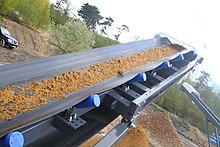
Project commissioning is the process of ensuring that all systems and components of a building or industrial plant are designed, installed, tested, operated, and maintained according to the owner's or final client's operational requirements. A commissioning process may be applied not only to new projects but also to existing units and systems subject to expansion, renovation or revamping.[1][2]
In practice, the commissioning process is the integrated application of a set of engineering techniques and procedures to check, inspect and test every operational component of the project: from individual functions (such as instruments and equipment) up to complex amalgamations (such as modules, subsystems and systems).
Commissioning activities in the broader sense applicable to all phases of the project from the basic and detailed design, procurement, construction and assembly until the final handover of the unit to the owner, sometimes including an assisted operation phase.
Similarly Refinery commissioning is defined as "The sequential, planned, and documented process of verifying, testing, and validating the performance of each refinery unit, system, and equipment to ensure they operate safely, efficiently, and within design specifications, culminating in the successful startup and steady-state operation of the entire refinery".